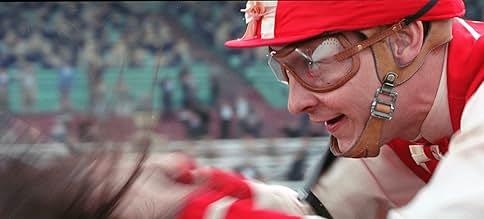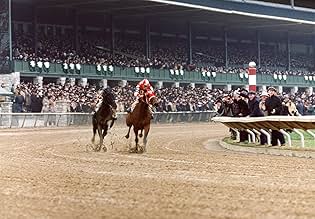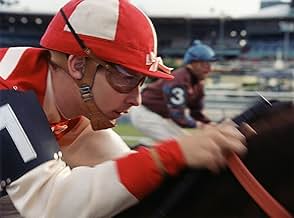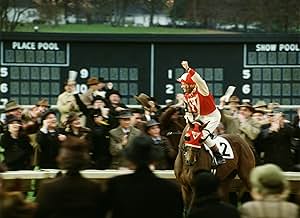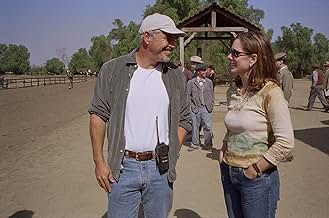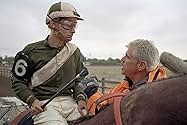História verídica do pequeno cavalo de corrida, na Época da Depressão, cujas vitórias levantaram não apenas o espírito da equipe por trás dele, mas também o de sua nação.História verídica do pequeno cavalo de corrida, na Época da Depressão, cujas vitórias levantaram não apenas o espírito da equipe por trás dele, mas também o de sua nação.História verídica do pequeno cavalo de corrida, na Época da Depressão, cujas vitórias levantaram não apenas o espírito da equipe por trás dele, mas também o de sua nação.
- Direção
- Roteiristas
- Artistas
- Indicado a 7 Oscars
- 6 vitórias e 44 indicações no total
Carl M. Craig
- Sam
- (as Kingston DuCoeur)
- Direção
- Roteiristas
- Elenco e equipe completos
- Produção, bilheteria e muito mais no IMDbPro
Avaliações em destaque
Based on the best-selling novel Seabiscuit: An American Legend by Laura Hillenbrand, Gary Ross directed 'Seabiscuit' is a film with a Spirit! It's a courageous true-story, that also makes a moving film. The Direction, The Cinematography, The Performances, all pitch in nicely.
'Seabiscuit' tells the story of Three men, who, come together, respectively, as the principal jockey, owner, and trainer of the championship horse Seabiscuit, rising from troubled times to achieve fame and success through their association with the horse.
Gary Ross's Adapted Screenplay, manages to make a worthy true-story into a worthy film. The characters, The Horse itself, are wonderfully explained. However, the film definitely could've been trimmed, by at least 10-15 minutes. Ross's direction deserves brownie points, as well. John Schwartzman's Cinematography is gorgeous. Editing is good. Art-Design seems perfect.
Performance-Wise: Tobey Maguire is dependable. Jeff Bridges is natural & restrained throughout, while Chris Cooper is simply fantastic. Elizabeth Banks is passable. Gary Stevens & William H. Macy are fair.
On the whole, 'Seabiscuit' comes up a winner in it's intentions. Go, get moved!
'Seabiscuit' tells the story of Three men, who, come together, respectively, as the principal jockey, owner, and trainer of the championship horse Seabiscuit, rising from troubled times to achieve fame and success through their association with the horse.
Gary Ross's Adapted Screenplay, manages to make a worthy true-story into a worthy film. The characters, The Horse itself, are wonderfully explained. However, the film definitely could've been trimmed, by at least 10-15 minutes. Ross's direction deserves brownie points, as well. John Schwartzman's Cinematography is gorgeous. Editing is good. Art-Design seems perfect.
Performance-Wise: Tobey Maguire is dependable. Jeff Bridges is natural & restrained throughout, while Chris Cooper is simply fantastic. Elizabeth Banks is passable. Gary Stevens & William H. Macy are fair.
On the whole, 'Seabiscuit' comes up a winner in it's intentions. Go, get moved!
So here it is: a story about a horse that would give spirit to a whole nation, after the depression of the late 20's and early 30's. Make it a story where the horse and it's jockey have to overcome injury to win it's final great race, and you got your tearjerker (and, therefore, Oscar winner) right there.
But, somehow, 'Seabiscuit' is much more than that. What is definitely a help, is it's incredible cast. Tobey McGuire once more shows he's one of the better youngsters around in Hollywood, and old-timers Jeff Bridges and Chris Cooper will do the rest for ya, even though Cooper is not at his best here as Tom Smith, the trainer for the horse. Then there's William H. Macy in a hilarious role as 'Tick Tock McGlaughlin', a radio presenter.
The life-story we follow the most though is that of Charles Howard (Bridges), owner of the horse. As a self-made millionaire selling cars, who lost his son due to a car-accident, he finds a little bit of joy back to life, with his new wife and his new love, the horsing business. His inspirational speeches make 'Seabiscuit' a crowd-pleaser, in particular that of the 'common people', who recognize themselves in the little horse.
As said, the movie is a little bit too much of a happy ending story to really make it into the 'classic' category, but the movie looks great and hasn't got a boring moment in it. Good acting all around therefore make it a very pleasant movie experience. Although the 7 academy award nominations were a little bit much...
7/10.
But, somehow, 'Seabiscuit' is much more than that. What is definitely a help, is it's incredible cast. Tobey McGuire once more shows he's one of the better youngsters around in Hollywood, and old-timers Jeff Bridges and Chris Cooper will do the rest for ya, even though Cooper is not at his best here as Tom Smith, the trainer for the horse. Then there's William H. Macy in a hilarious role as 'Tick Tock McGlaughlin', a radio presenter.
The life-story we follow the most though is that of Charles Howard (Bridges), owner of the horse. As a self-made millionaire selling cars, who lost his son due to a car-accident, he finds a little bit of joy back to life, with his new wife and his new love, the horsing business. His inspirational speeches make 'Seabiscuit' a crowd-pleaser, in particular that of the 'common people', who recognize themselves in the little horse.
As said, the movie is a little bit too much of a happy ending story to really make it into the 'classic' category, but the movie looks great and hasn't got a boring moment in it. Good acting all around therefore make it a very pleasant movie experience. Although the 7 academy award nominations were a little bit much...
7/10.
I have not read the book or anything about the story this movie was based on - I might have to now since I enjoyed the movie so much. The point of my writing this is to say: if you haven't read the book, you will probably like this movie. I'm sure the book portrayed so much more, but I don't think you can directly compare movies and books. In most cases, I have never loved a movie as much as a book - but that doesn't mean the movie should be disregarded. In some cases emotion can be better portrayed on film. (please note that all my "quotes" are paraphrased from what i remember and only set aside in " " to distinguish it from my writing).
That said, I completely disagree with the first reviewer above who did read the book first. I really DID get the message about what Seabiscuit represented at that time: a second chance, rising above expectations against all odds, and most of all - HOPE. When I told someone I just saw Seabiscuit, they said, "oh, that's about the horse, right?" and I said, "no, it's really a story of hope and rising above tough circumstances - but there is a horse in it." I was surprised at how much history and how many images of the depression were gracefully woven into Seabiscuit. I thought it worked very well and added to the realism of the film.
I also definitely understood that Red Pollard's family was wealthy, and that they lost everything in the depression. It's pretty obvious - the whole family is shown around a great big dinner table in a very nice house; his father even buys him his own horse. Next time you see them, they are basically living out of their car with a whole bunch of other folks doing the same - a kind of depression era makeshift camp.
It's also made clear later on in the movie that he never saw his family again - there are auditory flashbacks to his parents saying they will call him; how he almost dumps all his books into the water; the fact that next time we see him he's a young man and there's no mention of his family ever again in the movie. Seems like they just disappeared - and they did. Red also displays anger and frustration that is noticed by other characters. To me, this points to a sense of abandonment by his family.
Also unlike the other reviewer, I DID care a lot about the race with War Admiral - in fact, i almost had to just skip to the end first because I was so nervous about it! This was NOT just a story of profit. In fact, it never seemed like that was Howard's goal at all - his goal was to prove that the underdog can and will win - to prove that heart and spirit mattered as much as (or even more than) wealth and breeding. That seemed to be the point of the match race with War Admiral.
This is a story of rising above profit to reach an even greater goal. It's an uplifting story, as you can see in the crowd's faces as Howard tells them, "just because he's beaten down by a nose, doesn't mean he's out." and "When the little guy doesn't know he's the little guy, he can do great big things." You can picture the men and women, unemployed and hungry, telling themselves these same words. Things will get better; we may be down, but we're not out. In the words of Tom Smith, "You can't throw a whole life away, just because it's banged up a bit." Red's words at the end are touching as well, "seabiscuit fixed us, and in a sense we fixed each other.'" Red overcame his anger, his fear, his sense of hopelessness. So did Seabiscuit. And if they can, so can you.
That said, I completely disagree with the first reviewer above who did read the book first. I really DID get the message about what Seabiscuit represented at that time: a second chance, rising above expectations against all odds, and most of all - HOPE. When I told someone I just saw Seabiscuit, they said, "oh, that's about the horse, right?" and I said, "no, it's really a story of hope and rising above tough circumstances - but there is a horse in it." I was surprised at how much history and how many images of the depression were gracefully woven into Seabiscuit. I thought it worked very well and added to the realism of the film.
I also definitely understood that Red Pollard's family was wealthy, and that they lost everything in the depression. It's pretty obvious - the whole family is shown around a great big dinner table in a very nice house; his father even buys him his own horse. Next time you see them, they are basically living out of their car with a whole bunch of other folks doing the same - a kind of depression era makeshift camp.
It's also made clear later on in the movie that he never saw his family again - there are auditory flashbacks to his parents saying they will call him; how he almost dumps all his books into the water; the fact that next time we see him he's a young man and there's no mention of his family ever again in the movie. Seems like they just disappeared - and they did. Red also displays anger and frustration that is noticed by other characters. To me, this points to a sense of abandonment by his family.
Also unlike the other reviewer, I DID care a lot about the race with War Admiral - in fact, i almost had to just skip to the end first because I was so nervous about it! This was NOT just a story of profit. In fact, it never seemed like that was Howard's goal at all - his goal was to prove that the underdog can and will win - to prove that heart and spirit mattered as much as (or even more than) wealth and breeding. That seemed to be the point of the match race with War Admiral.
This is a story of rising above profit to reach an even greater goal. It's an uplifting story, as you can see in the crowd's faces as Howard tells them, "just because he's beaten down by a nose, doesn't mean he's out." and "When the little guy doesn't know he's the little guy, he can do great big things." You can picture the men and women, unemployed and hungry, telling themselves these same words. Things will get better; we may be down, but we're not out. In the words of Tom Smith, "You can't throw a whole life away, just because it's banged up a bit." Red's words at the end are touching as well, "seabiscuit fixed us, and in a sense we fixed each other.'" Red overcame his anger, his fear, his sense of hopelessness. So did Seabiscuit. And if they can, so can you.
"Sea Biscuit" is a story about a long shot horse and a man who discover each other on the road to equestrian glory. An extremely rewarding journey though the lives of man and beast. Every aspect of human emotion, bonding and courage is explored with an "equine" tinge. Set in a time when horse racing is more passion than business, Seabiscuit glorifies the positive appeal of horse racing. Every derby event is an emotional doorway which lifts your spirits. Be it the Santa Anita or the Pimilco, you are just just hanging on the edge of your seat praying, vying and hoping for a Seabiscuit win. Such is the emotional grasp and visual brilliance of Gary Ross's direction and Scwartzman's cinematography. Being a thoroughbred race horse by birth, Seabiscuit treads the race track under the watchful eyes of trainer Tom Smith (played by Chris Cooper) and jockey Red Poddard (played by Tobey Mcguire). What follows is a sequence of predictable vicissitudes. Why! This movie wasn't advertised in the mystery genre either!
A frail looking (really) Tobey manages to deeply bond with the horse at least on screen, kudos indeed. Nobody else could have possibly fit into his role as well as he did, physically too. Chris Cooper is the silent marvel. There is a completely subtle tinge to his acting which lays low, yet beautifully exuberates class. Seabiscuit is simply one of those "silent' movies which just hurtles you beyond imaginable frontiers. Sit back and relax and let the long shot consume you.
A frail looking (really) Tobey manages to deeply bond with the horse at least on screen, kudos indeed. Nobody else could have possibly fit into his role as well as he did, physically too. Chris Cooper is the silent marvel. There is a completely subtle tinge to his acting which lays low, yet beautifully exuberates class. Seabiscuit is simply one of those "silent' movies which just hurtles you beyond imaginable frontiers. Sit back and relax and let the long shot consume you.
As the depression era kicks in, Americans were grasping for any sort of inspiration they could get, enter equine supreme, Seabiscuit. Considered broken down, too small and untrainable, Seabiscuit went on to become a bastion of great racehorses and in the process bringing solace to those closest to it.
Back in 2003 upon its initial release, critics were very divided as to the merits of Seabiscuit as a picture. Some were concerned that this adaptation from Laura Hillenbrand's highly thought of novel missed too many crucial elements, others were merely touting the tired old charge of the film purely baiting Oscar (something that is levelled at every film in history about hope and second chances), the more astute critics of the time however lauded it as the delightful and inspiring piece that it is.
It would be churlish of me to not agree that Seabiscuit is laced with sentiment, rookie director Gary Ross barely wastes a chance to tug the heart strings and paint an evocative sequence, but if you have got it in you to accept this true story for its base emotional point, then it is one hell of a wonderful experience. Seabiscuit is not just about the equine beauty of the picture, it's also a fusion of three men's personal wavering, who for one reason or another need the horse for far more important crutches than those provided by financial gain, make no bones about it, Seabiscuit is a very human drama. Knowing how the picture will end never once becomes a problem, because the historical accuracy in the story makes one yearn for that grandiose ending, one to gladden the heart in the way it must have done to thousands upon thousands of Americans back in the depression era day.
Ross wisely chooses to filter in as much realism as he possibly can, archive stills and narration serve as exceptional points of worth to the narrative structure. Then there is the first rate cast to fully form the emotional complexities that Seabiscuit provides. Jeff Bridges, Tobey Maguire (waif like), Chris Cooper, Elizabeth Banks, top American jockey Gary Stevens and a splendidly jaunty William H Macy, all can rightly feel proud of their respective work on this picture. Yet it's with the thundering race sequences that Seabiscuit really triumphs best, magnificent beasts hurtling around the race track are excellently handled by Ross and his cinematographer, John Schwartzman, whilst a nod of approval must go to the sound department's efforts, for this is definitely one to give your sub-woofer a work out.
Seabiscuit was nominated for seven Academy Awards, winning none, perhaps the Academy also felt like those critics who thought it was trying too hard for a Golden Statue? But now after the dust has settled some years later, it pays to revisit Seabiscuit and judge it on its own emotional terms, for it's a tremendously well crafted picture that is of course as inspirational as it most assuredly is tender, a fine fine picture indeed. 9/10
Back in 2003 upon its initial release, critics were very divided as to the merits of Seabiscuit as a picture. Some were concerned that this adaptation from Laura Hillenbrand's highly thought of novel missed too many crucial elements, others were merely touting the tired old charge of the film purely baiting Oscar (something that is levelled at every film in history about hope and second chances), the more astute critics of the time however lauded it as the delightful and inspiring piece that it is.
It would be churlish of me to not agree that Seabiscuit is laced with sentiment, rookie director Gary Ross barely wastes a chance to tug the heart strings and paint an evocative sequence, but if you have got it in you to accept this true story for its base emotional point, then it is one hell of a wonderful experience. Seabiscuit is not just about the equine beauty of the picture, it's also a fusion of three men's personal wavering, who for one reason or another need the horse for far more important crutches than those provided by financial gain, make no bones about it, Seabiscuit is a very human drama. Knowing how the picture will end never once becomes a problem, because the historical accuracy in the story makes one yearn for that grandiose ending, one to gladden the heart in the way it must have done to thousands upon thousands of Americans back in the depression era day.
Ross wisely chooses to filter in as much realism as he possibly can, archive stills and narration serve as exceptional points of worth to the narrative structure. Then there is the first rate cast to fully form the emotional complexities that Seabiscuit provides. Jeff Bridges, Tobey Maguire (waif like), Chris Cooper, Elizabeth Banks, top American jockey Gary Stevens and a splendidly jaunty William H Macy, all can rightly feel proud of their respective work on this picture. Yet it's with the thundering race sequences that Seabiscuit really triumphs best, magnificent beasts hurtling around the race track are excellently handled by Ross and his cinematographer, John Schwartzman, whilst a nod of approval must go to the sound department's efforts, for this is definitely one to give your sub-woofer a work out.
Seabiscuit was nominated for seven Academy Awards, winning none, perhaps the Academy also felt like those critics who thought it was trying too hard for a Golden Statue? But now after the dust has settled some years later, it pays to revisit Seabiscuit and judge it on its own emotional terms, for it's a tremendously well crafted picture that is of course as inspirational as it most assuredly is tender, a fine fine picture indeed. 9/10
Você sabia?
- CuriosidadesThe movie describes War Admiral as huge, close to 18 hands tall. In real life, War Admiral was about 15 hands tall, the same size as Seabiscuit.
- Erros de gravaçãoWar Admiral is repeatedly referred to as being 18 hands vs. Seabiscuit's 15 hands. The horses were actually the same height, with some sources listing Seabiscuit as the heavier of the two.
- ConexõesEdited into The Making of 'Seabiscuit' (2003)
- Trilhas sonorasMexico Lucido
Performed by Jose Hernandez and the Mariachi Sol de Mexico (as Mariachi Sol de Mexico de Jose Hernandez)
Courtesy of Serenata Records
Principais escolhas
Faça login para avaliar e ver a lista de recomendações personalizadas
- How long is Seabiscuit?Fornecido pela Alexa
Detalhes
- Data de lançamento
- País de origem
- Idioma
- Também conhecido como
- Alma de héroe
- Locações de filme
- Hemet, Califórnia, EUA(Hemet Stock Farm)
- Empresas de produção
- Consulte mais créditos da empresa na IMDbPro
Bilheteria
- Orçamento
- US$ 87.000.000 (estimativa)
- Faturamento bruto nos EUA e Canadá
- US$ 120.277.854
- Fim de semana de estreia nos EUA e Canadá
- US$ 20.854.735
- 27 de jul. de 2003
- Faturamento bruto mundial
- US$ 148.336.445
- Tempo de duração2 horas 20 minutos
- Cor
- Mixagem de som
- Proporção
- 2.39 : 1
Contribua para esta página
Sugerir uma alteração ou adicionar conteúdo ausente


